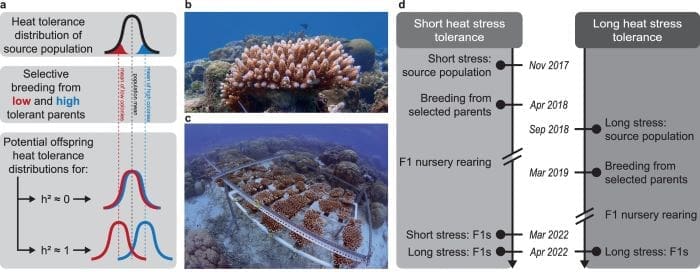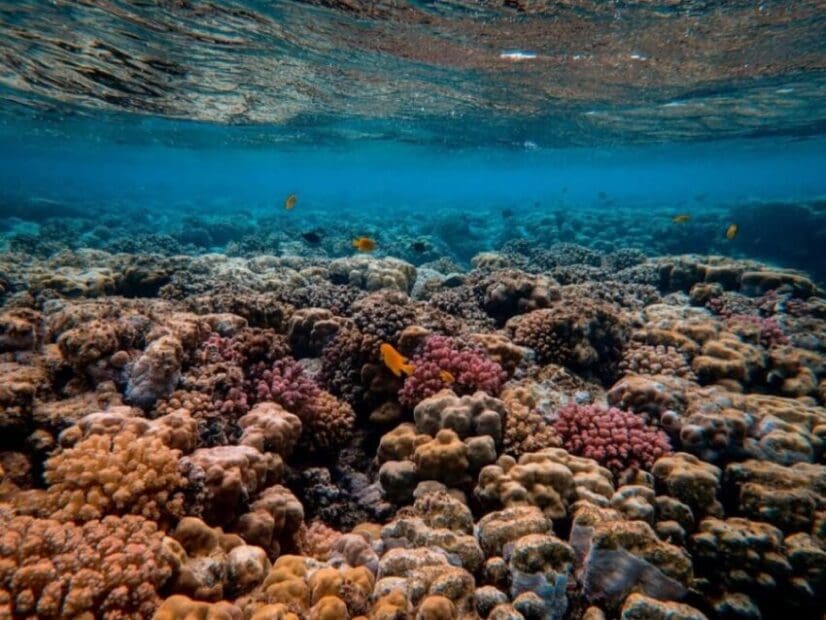In a groundbreaking study, researchers have demonstrated that selective breeding can improve the heat tolerance of coral species, potentially helping these vulnerable marine ecosystems to endure the increasingly severe marine heatwaves brought on by climate change.
Conducted by experts at Newcastle University’s Coralassist Lab, this is the first global effort to selectively breed adult corals with enhanced heat tolerance, offering a glimpse of hope for coral reefs under threat.
The study, published in Nature Communications, reveals that selective breeding can lead to a modest increase in heat tolerance in coral offspring.

“This work shows that selective breeding is feasible but not a silver bullet solution, and that more research is needed to maximise breeding outcomes,” says Liam Lachs, Postdoctoral Research Associate at Newcastle University and lead author of the study. Lachs emphasizes that despite the potential of this new approach, rapid and substantial reductions in global greenhouse gas emissions are essential for mitigating warming and allowing corals to adapt.
Selective breeding trial: a five-year project
The publication stems from a five-year research initiative led by Dr. James Guest, Reader in Coral Reef Ecology at Newcastle University’s School of Natural and Environmental Sciences, with funding from the European Research Council. This project brought together researchers from the University of Victoria, the University of Exeter, the Horniman Museum and Gardens, the Palau International Coral Reef Center, and the University of Derby.
Selective breeding, long used in agriculture, is now being explored as a tool for conservation. By selecting corals with higher heat tolerance and breeding them, scientists aimed to enhance the resilience of coral offspring. The team tested two different traits: short-term tolerance to intense heat (10 days at +3.5°C) and long-term tolerance to moderate heat (1 month at +2.5°C).
Their results were promising, as parent colonies with higher heat tolerance produced offspring that were better equipped to handle increased temperatures. The researchers estimated that the corals’ heat tolerance could be improved by approximately 1 °C-week within one generation.
While modest, this enhancement is significant as it shows the potential of selective breeding to improve coral resilience. However, it may not be enough to counteract the intense heatwaves expected if global warming continues unchecked.
Despite these promising findings, the study authors caution that selective breeding alone is not a sufficient solution for coral survival. “The results show that selective breeding could be a viable tool to improve population resilience. Yet, there are still many challenges that need to be overcome,” explains Dr. Guest. These challenges include determining the number of corals needed to benefit wild populations, ensuring that selected traits persist in the wild, and maximizing responses to selection without risking unintended consequences.
One of the more complex issues is the independent genetic control of different heat tolerance traits. Dr. Adriana Humanes, Postdoctoral Research Associate at Coralassist Lab, Newcastle University and lead author of the study, notes that selective breeding for one trait (such as short-term heat tolerance) may not necessarily enhance the ability of corals to survive under long-term heat stress. This presents a challenge for management interventions, as the traits necessary for long-term survival under natural conditions may not align with those that are easier to assess in a laboratory setting.
Implications for coral conservation
The selective breeding study is an essential proof of concept, indicating that corals can indeed be bred for increased heat tolerance. However, the study authors stress that further research is needed to understand how to optimize these breeding interventions to align with realistic climate change scenarios.
The researchers advocate for continued investigation into which traits to prioritize and how these traits are genetically correlated. As Dr. Humanes puts it: “Considerable work remains before selective breeding can be successfully implemented. A deeper understanding is needed to determine which traits to prioritize and how these traits are genetically correlated.”
The researchers also highlight the importance of concurrent climate action. Even with advancements in selective breeding, corals are unlikely to withstand the pace and intensity of heatwaves associated with unmitigated climate change. “Given the moderate levels of enhancement we achieved in this study, the effectiveness of such interventions will also depend on urgent climate action,” Dr. Guest emphasizes.
The study offers a glimpse into a future where selective breeding could help build more resilient coral populations. However, as the authors stress, immediate and significant reductions in greenhouse gas emissions remain critical to giving coral reefs a fighting chance. The world’s coral reefs continue to face the dual threats of climate change and local stressors, and this research underscores that the path to coral conservation will require a combination of innovation, scientific insight, and urgent climate action.
Journal Reference:
Humanes, A., Lachs, L., Beauchamp, E. et al. ‘Selective breeding enhances coral heat tolerance to marine heatwaves’, Nature Communications 15, 8703 (2024). DOI: 10.1038/s41467-024-52895-1
Article Source:
Press Release/Material by Newcastle University
Featured image credit: Francesco Ungaro | Unsplash




